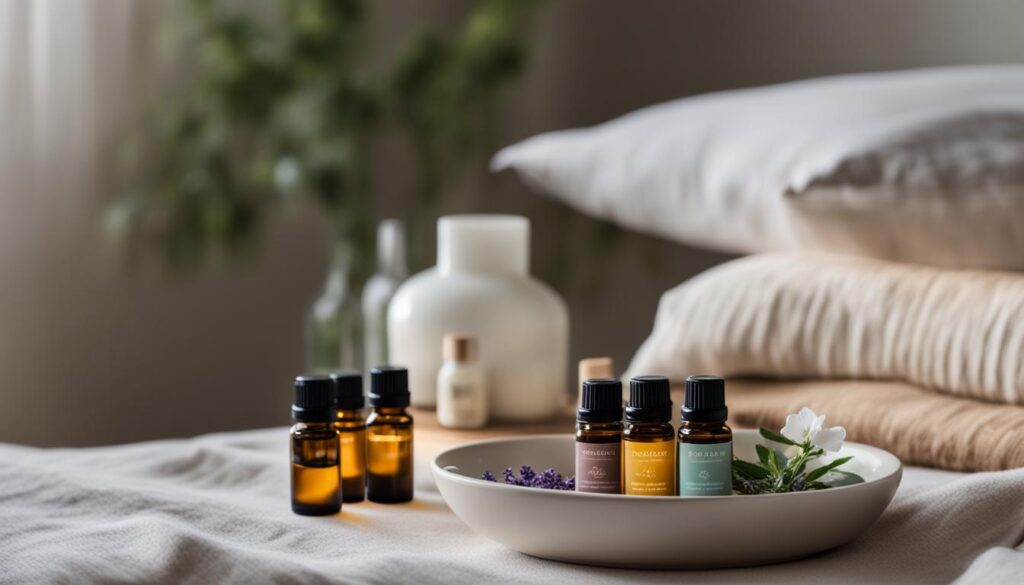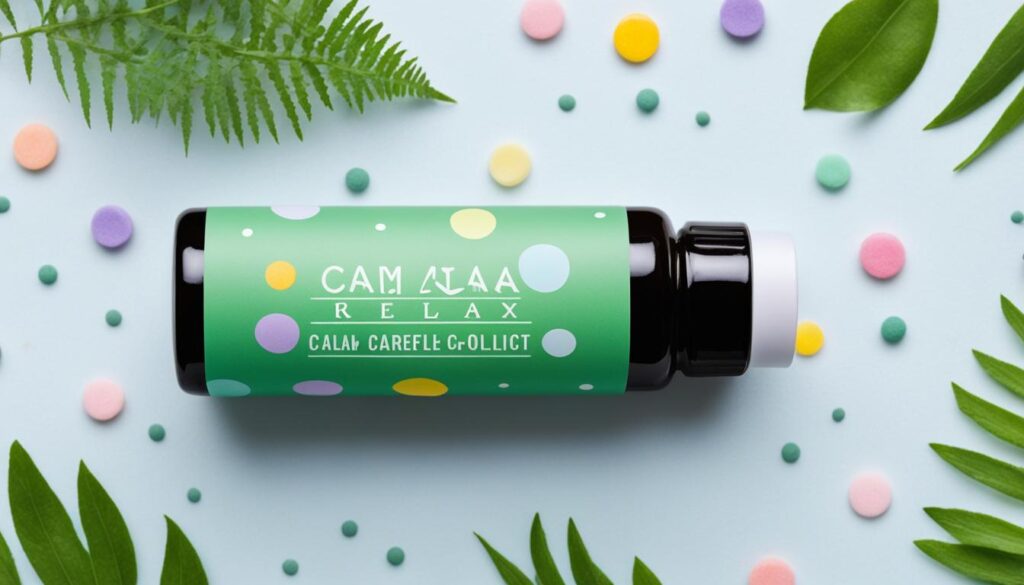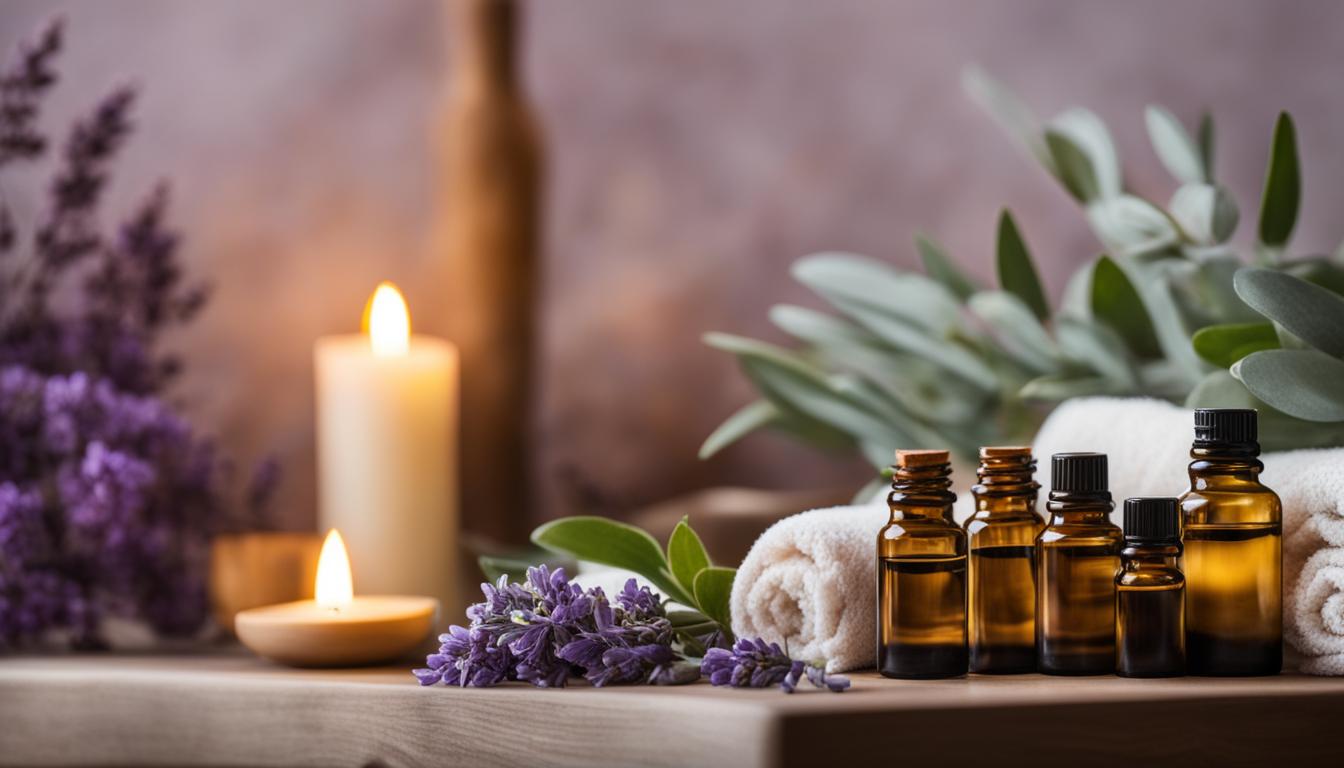In today’s fast-paced world, finding ways to relax and unwind is crucial for maintaining our well-being. One effective method that has been used for centuries is aromatherapy, specifically the use of essential oils. These natural remedies have gained popularity for their ability to promote relaxation and relieve stress. In this article, I will guide you through the best essential oils for relaxation, providing you with the knowledge to find serenity in your daily life.
Using essential oils for stress relief is a safe and natural alternative to pharmaceuticals. These oils, extracted from plants, contain powerful aromatic compounds that can influence our moods and emotions. Whether diffused, applied topically, or added to bathwater, essential oils can create a calming atmosphere and help quiet the mind.
Join me as we explore the top essential oils for relaxation, the science behind their effects, and how to incorporate them into your daily routine. Together, we will unlock the power of these calming essential oils and discover the serenity they can bring to our lives.
Key Takeaways:
- Essential oils are natural remedies that can promote relaxation and relieve stress.
- Aromatherapy, through the use of essential oils, has been used for centuries to enhance well-being.
- Top essential oils for relaxation include lavender, chamomile, bergamot, and ylang-ylang.
- These essential oils can be diffused, applied topically, or added to bathwater for their calming effects.
- Incorporating essential oils into your daily routine can help create a serene and peaceful environment.
Unlocking the Power of Aromatherapy for Stress Relief
In this section, we will delve into the power of aromatherapy for stress relief and relaxation. Aromatherapy, the practice of using essential oils derived from plants, has been used for centuries to promote well-being and enhance relaxation. By harnessing the therapeutic properties of essential oils, aromatherapy offers a natural and holistic approach to alleviating stress and promoting a sense of calm.
The Science of Scent and Well-Being
Have you ever noticed how certain scents have the power to evoke strong emotions or trigger specific memories? The sense of smell is deeply connected to our brain’s limbic system, which is responsible for regulating emotions and memories. When we inhale aromatic compounds from essential oils, they stimulate the olfactory receptors in our nasal passages, sending signals to the brain that can influence our mood, emotions, and overall well-being.
Research has shown that certain aromas have the ability to induce relaxation, reduce anxiety, and promote a sense of calm. By understanding the science of scent and well-being, we can harness the power of aromatherapy to support our mental and emotional health.
How Aromatherapy Works to Alleviate Stress
Aromatherapy works through several mechanisms to alleviate stress and promote relaxation. Firstly, the inhalation of essential oils stimulates the release of neurotransmitters such as serotonin and endorphins, which are known as the “feel-good” chemicals in the brain. This leads to a sense of relaxation and emotional balance.
Secondly, essential oils can directly affect our physiological responses to stress. When inhaled, the aromatic molecules of essential oils can have a calming effect on the nervous system, reducing the production of stress hormones such as cortisol. The relaxation response triggered by aromatherapy helps to counteract the negative effects of chronic stress on our physical and mental well-being.
Setting the Stage for Relaxation with Oils
Creating a calming environment is essential for effective relaxation. To set the stage for relaxation with essential oils, we should consider the following:
- Choose a quiet and comfortable space where you can relax without distractions.
- Use a diffuser or oil burner to disperse the scent of essential oils throughout the room.
- Create a soothing ambience with soft lighting, calming music, or nature sounds.
- Combine aromatherapy with other relaxation techniques such as deep breathing, meditation, or gentle stretches.
By incorporating these elements into your relaxation routine, you can maximize the calming effects of essential oils and create a serene atmosphere conducive to stress relief.
| Benefits of Aromatherapy for Stress Relief | How to Use Essential Oils for Relaxation |
|---|---|
| – Reduces anxiety and promotes a sense of calm | – Diffuse essential oils using a diffuser or oil burner |
| – Alleviates stress and tension in the body | – Add a few drops of essential oil to a warm bath |
| – Enhances mood and uplifts the spirit | – Massage diluted essential oils onto the skin |
| – Improves sleep quality and reduces insomnia | – Inhale essential oils directly from the bottle |
By incorporating aromatherapy into your daily routine, you can experience the countless benefits it offers for relaxation and stress relief.
Top Calming Essential Oils to Soothe Your Mind
In this section, I will introduce the top calming essential oils that can soothe your mind and promote relaxation. These essential oils have been proven to help reduce anxiety and depression, allowing you to find peace and tranquillity in your everyday life.
Using essential oils for relaxation and sleep is a natural and effective way to alleviate stress and promote a sense of calm. The aromatherapeutic properties of these oils work synergistically with your body and mind, gently easing tension and calming your nervous system.
Here are some of the best essential oils for anxiety and depression:
- Lavender: Known for its calming and soothing properties, lavender essential oil is a popular choice for relaxation. It can help reduce stress, promote better sleep, and alleviate symptoms of anxiety and depression.
- Chamomile: This gentle oil is known for its calming effects on the mind and body. It can help ease nervous tension, promote relaxation, and support healthy sleep patterns.
- Bergamot: With its uplifting and citrusy scent, bergamot essential oil can help relieve anxiety and stress. It has mood-enhancing properties that promote relaxation and improve overall well-being.
- Ylang Ylang: Known for its sweet and floral aroma, ylang-ylang essential oil is often used to reduce stress and anxiety. It can help balance emotions, promote a sense of calm, and enhance relaxation.
- Vetiver: This deep, earthy oil has grounding properties that can help ease anxiety and promote relaxation. It can help quiet an overactive mind and improve sleep quality.
- Sandalwood: With its warm and woody scent, sandalwood essential oil can help promote relaxation and reduce anxiety. It has a grounding effect on the mind and body, allowing you to find a sense of inner peace.
These essential oils can be used in various ways to enhance relaxation and support mental well-being. You can add a few drops to a diffuser or inhaler, dilute them in a carrier oil for a calming massage, or incorporate them into your bath or skincare routine.
Remember to always use high-quality essential oils and follow proper dilution guidelines to ensure safe and effective use.

Drifting Off: Essential Oils for Peaceful Sleep
Creating a Restful Sleep Environment
Creating a restful sleep environment is essential for achieving peaceful sleep. The right atmosphere can help relax your mind and body, making it easier to drift off into a deep slumber. Essential oils play a vital role in creating this soothing sleep environment.
By using essential oils with calming properties, you can transform your bedroom into a tranquil sanctuary. Place a few drops of your chosen essential oil on a diffuser or a cotton ball and position it near your bed. As you inhale the gentle scent, your body will naturally relax, paving the way for a night of peaceful sleep.
Here are some popular essential oils known for their sleep-inducing properties:
- Lavender
- Chamomile
- Sandalwood
- Bergamot
Incorporating these essential oils into your bedtime routine can help create a calm and serene sleep environment, promoting a restful night’s sleep.
Nighttime Blends for Better Sleep Quality
While single essential oils can be effective on their own, blending different oils can enhance their synergistic effects and improve sleep quality. Blending essential oils allows you to create customized nighttime blends that cater to your specific sleep needs.
Here is a simple recipe for a bedtime blend to promote peaceful sleep:
Blend 3 drops of lavender essential oil, 2 drops of chamomile essential oil, and 1 drop of sandalwood essential oil. Dilute the blend with a carrier oil, such as jojoba or almond oil, and apply it to your pulse points or add it to a nighttime diffuser.
This soothing blend combines the calming properties of lavender and chamomile with the grounding effects of sandalwood, helping you relax and unwind before bed.
| Essential Oil | Properties | Benefits |
|---|---|---|
| Lavender | Calming, sedative | Promotes relaxation and reduces anxiety for better sleep |
| Chamomile | Soothing, anti-inflammatory | Relieves stress and promotes a sense of calmness |
| Sandalwood | Grounding, sedative | Induces relaxation and supports deep sleep |
By incorporating essential oils into your sleep routine, you can create a restful sleep environment and improve the quality of your sleep. Experiment with different oils and blends to find the combination that works best for you. Say goodbye to sleepless nights and embrace the soothing power of essential oils for peaceful sleep.
Best Essential Oils for Relaxation and Their Synergistic Effects
In this section, I will highlight the best essential oils for relaxation and their synergistic effects when combined. Using essential oils is a natural and effective way to promote deep relaxation and calm the mind and body.
One of the best essential oils for relaxation is **Lavender**. Its soothing aroma has been used for centuries to promote relaxation and reduce stress. Lavender oil can help relieve anxiety and promote better sleep quality, making it an excellent choice for relaxation.
Another essential oil that is known for its calming properties is **Chamomile**. Chamomile oil has a gentle and comforting scent that can help reduce anxiety and promote relaxation. It is often used in aromatherapy to promote a sense of calmness and tranquillity.
**Bergamot** is also a popular essential oil for relaxation. It has a citrusy and uplifting scent that can help reduce stress and anxiety. Bergamot oil is often used to create a soothing atmosphere and promote a positive mood.
In addition to these single oils, using essential oil blends can provide even more powerful relaxation effects. Combining different oils can create a synergistic blend that enhances their benefits. For example, blending Lavender, Chamomile, and Bergamot can create a calming and relaxing blend that is perfect for relieving stress and promoting relaxation.
| Essential Oil | Main Benefits |
|---|---|
| Lavender | Reduces anxiety, promotes better sleep |
| Chamomile | Calming, reduces stress and anxiety |
| Bergamot | Uplifting, promotes relaxation and a positive mood |
When using essential oils for relaxation, it’s important to choose high-quality oils from reputable brands. Ensure that you are using pure essential oils without any additives or synthetic fragrances for the best results.
Whether you prefer single oils or blends, incorporating essential oils into your relaxation routine can provide you with a natural and effective way to find serenity and calmness in your everyday life.
Where to Apply Essential Oils for Maximized Calming Effects
To maximize the calming effects of essential oils, it is important to apply them to specific areas of the body. By targeting these areas, you can enhance the absorption and effectiveness of the oils, promoting relaxation and reducing anxiety.
Topical Application Techniques for Anxiety Relief
When it comes to relieving anxiety, topical application of essential oils can be highly beneficial. The following are some effective techniques for applying essential oils to help alleviate anxiety:
- Roll-On Application: Using a roll-on bottle, you can easily apply essential oils to your pulse points, such as your wrists, neck, and temples. This allows the oils to be absorbed into your bloodstream more quickly, promoting a sense of calm.
- Mix with Carrier Oils: Diluting essential oils with carrier oils, such as coconut oil or jojoba oil, can help reduce the risk of skin irritation and increase the spreadability of the oils. Apply the diluted mixture to areas of tension or stress, such as the back of the neck or the soles of the feet.
- Aromatherapy Massage: Combine a few drops of essential oil with a carrier oil and massage it into your skin. This not only allows for topical absorption but also provides a relaxing and soothing experience.
Essential Oils and Skin Sensitivity: Precautions and Tips
While essential oils can provide numerous benefits, it is important to be aware of their potential to cause skin sensitivity or irritation. Here are some precautions and tips to keep in mind:
- Perform a Patch Test: Before applying an essential oil to a larger area of your body, perform a patch test by applying a small amount of diluted oil to a small patch of skin. Wait 24 hours to see if any irritation or redness occurs.
- Dilute, Dilute, Dilute: It is important to always dilute essential oils, especially if you have sensitive skin. This helps to minimize the risk of irritation. Follow the recommended dilution guidelines for each essential oil.
- Choose Skin-Friendly Oils: Some essential oils are more likely to cause skin irritation than others. If you have sensitive skin, opt for oils that are known to be gentle, such as lavender, chamomile, or frankincense.

By following these guidelines and being mindful of your skin’s sensitivity, you can safely and effectively apply essential oils for anxiety relief. Remember, everyone’s skin is different, so it’s important to listen to your body and make adjustments accordingly.
Enhancing Your Living Space: Relaxing Essential Oils for Diffuser
In this section, I’ll guide you on how to enhance your living space with relaxing essential oils using a diffuser. Creating a calming and soothing environment in your home is essential for promoting relaxation and well-being.
Choosing the Right Diffuser for Your Needs
When it comes to diffusers, there are various types to choose from, each with its unique features and benefits. Here are some popular diffuser options:
- Ultrasonic Diffusers: These diffusers use ultrasonic vibrations to break down essential oils into fine mist particles, which are then dispersed into the air. They also act as humidifiers, adding moisture to your surroundings.
- Nebulizing Diffusers: Nebulizing diffusers disperse essential oils directly into the air without the need for water or heat. They create a strong concentration of essential oils, making them ideal for larger spaces or those looking for a more intense aroma.
- Evaporative Diffusers: Evaporative diffusers use a fan or heat to diffuse essential oils. They work by evaporating the oil, allowing it to be carried in the air. These types of diffusers are user-friendly and portable.
When choosing a diffuser, consider factors such as the size of your room, the intensity of the aroma you desire, and any specific features you may be looking for, such as colour-changing lights or timers.
DIY Room Sprays and Other Diffusion Methods
Another way to enjoy the benefits of relaxing essential oils is by creating DIY room sprays or using alternative diffusion methods. Here are a few ideas:
- Room Sprays: Mix your favourite relaxing essential oils with distilled water in a spray bottle. Simply spritz the mist into the air or onto linens to create a calming atmosphere.
- Aroma Jewelry: Apply a few drops of your preferred essential oil onto a diffuser necklace or bracelet. As you wear the jewellery, the scent will diffuse throughout the day, keeping you calm and relaxed.
- Inhalation: Add a few drops of essential oil to a bowl of hot water and create a tent using a towel. Gently inhale the steam for a soothing and refreshing experience.
Experiment with different DIY room spray recipes and diffusion methods to find what works best for you and your living space.
Integrating Essential Oils into Your Relaxation Routines
When it comes to promoting relaxation and reducing anxiety and stress, essential oils are incredibly powerful tools. Incorporating them into your daily routine can have a profound impact on your overall well-being. In this section, we will explore different ways to integrate essential oils into your relaxation routines, allowing you to harness their therapeutic benefits for maximum effect.
Massage: One effective method of incorporating essential oils into your relaxation routine is through massage. Mixing a few drops of your preferred essential oil with a carrier oil, such as almond or jojoba oil, can create a soothing and aromatic massage blend. The gentle and rhythmic motions of massage combined with the fragrant essence of essential oils can help melt away stress and tension.
Bath: Another way to enjoy the calming effects of essential oils is by adding them to your bathwater. Create a tranquil sanctuary by mixing a few drops of essential oil into a warm bath. The steam will release the aromatic molecules, allowing you to breathe in their therapeutic scents and experience a deep sense of relaxation.
Meditation: Essential oils can also enhance your meditation practice, helping you find a sense of calm and balance. Before starting your meditation session, place a few drops of your chosen essential oil on a tissue or cotton ball and place it near you. As you enter a state of mindfulness, the aroma will help create a soothing atmosphere, fostering a deeper sense of tranquillity.
By integrating essential oils into your relaxation routines through massage, baths, and meditation, you can unlock your full potential and experience a heightened sense of calm and well-being. These powerful oils work synergistically with your body and mind to promote relaxation, reduce anxiety and stress, and support overall emotional balance.
Soothing Scents: The Best Oils for Calming Skin
In this section, I will discuss the best essential oils for calming skin. These oils have soothing properties and can provide numerous benefits for skin health. Additionally, they are known to help reduce stress and anxiety, making them excellent choices for enhancing your self-care routine. Whether you struggle with sensitive skin or simply want to promote a sense of calm and relaxation, these essential oils will nourish and soothe your skin.
When it comes to choosing the best oil for calming skin, several options have proven to be highly effective. These essential oils can be used in various ways, such as in skincare products, massage oils, or added to bathwater for a luxurious and calming experience.
Here are some of the top essential oils for calming skin:
- Lavender: Known for its relaxing and soothing properties, lavender essential oil is excellent for promoting calmness and reducing skin irritations. It can also help improve sleep quality and relieve anxiety.
- Chamomile: Chamomile essential oil is well-known for its calming effects on both the mind and skin. It can help reduce redness, irritation, and inflammation, making it ideal for sensitive or irritated skin.
- Neroli: Neroli essential oil has a delightful floral scent and is known to promote relaxation and calmness. It can help regulate oil production, improve the appearance of scars, and reduce the signs of ageing.
- Sandalwood: With its woody and earthy aroma, sandalwood essential oil is renowned for its calming and grounding properties. It can hydrate and soothe dry skin, reduce inflammation, and promote a sense of tranquillity.
These essential oils can be used individually or combined to create a personalized blend that suits your needs. You can dilute them with a carrier oil, such as jojoba or almond oil, before applying them to your skin. Alternatively, you can add a few drops to your bathwater or use them in an aromatherapy diffuser to enjoy their calming effects.
Remember to perform a patch test before using any essential oils on your skin, especially if you have sensitive skin or allergies. It’s also essential to follow proper dilution guidelines and consult with a healthcare professional if you have any concerns or specific conditions.
By incorporating these best oils for calming skin into your skincare routine, you can experience the soothing benefits they offer while indulging in a moment of relaxation and self-care.
Conclusion
In conclusion, embracing natural remedies is a key component of living a stress-free life. Throughout this article, we have explored the power of essential oils for promoting serenity and wellness. By incorporating these natural remedies into your daily routine, you can experience the transformative benefits they offer.
Among the top essential oils for relaxation, lavender, peppermint, and eucalyptus stand out as the best options. Lavender essential oil is renowned for its calming properties and ability to promote better sleep. Peppermint essential oil provides a refreshing and invigorating scent, ideal for relieving stress and promoting mental clarity. Finally, eucalyptus essential oil offers a soothing aroma that can help reduce congestion and promote a sense of relaxation.
Whether you are seeking everyday relaxation or relief from anxiety and stress, these essential oils can be your trusted companions. The natural power of lavender, peppermint, and eucalyptus can bring serenity and wellness into your life. Harness the benefits of these essential oils and embark on a fulfilling relaxation journey today.
FAQ
What are the best essential oils for relaxation?
The best essential oils for relaxation include lavender, ylang-ylang, sandalwood, rose, jasmine, chamomile, cedarwood, bergamot, neroli, and clary sage.
How do essential oils help with stress relief?
Essential oils help with stress relief by promoting relaxation, reducing anxiety and depression, and alleviating tension in the body and mind.
Can essential oils help with sleep?
Yes, certain essential oils like lavender, ylang-ylang, and chamomile can help promote peaceful sleep and improve sleep quality.
Where should I apply essential oils for anxiety?
Essential oils can be applied to the chest, temples, wrists, or the bottom of your feet for anxiety relief.
What is the best way to use essential oils for relaxation?
Essential oils for relaxation can be used in various ways, including aromatherapy through diffusers, topical application through massage or bath, and inhalation through steam or inhalers.
Can essential oils be used to calm the skin?
Yes, essential oils like lavender, chamomile, and geranium have soothing properties that can calm and nourish the skin.
How do I choose the right diffuser for relaxing essential oils?
The right diffuser for relaxing essential oils depends on your personal preferences and needs. Ultrasonic diffusers, nebulizing diffusers, and heat diffusers are popular options to consider.
How can I integrate essential oils into my relaxation routines?
You can integrate essential oils into your relaxation routines by using them in massages, baths, meditation practices, or creating a calming atmosphere with diffusers.
What are the best essential oils for calming the mind?
Essential oils like lavender, frankincense, vetiver, and cedarwood are known for their calming effects on the mind and can help reduce stress and anxiety.




